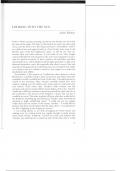LOOKING INTO THE SUN
Leslie Bienen
W HEN I WOKE up that morning, my throat was already sore from the
dry heat of the night. The hair on the back of my neck was sticky with
sweat, and the futon cover felt damp and heavy. At breakfast, while I
ate a dish of rice and sipped noisily at a bowl of salty miso soup, I told
Mother that I had had nightmares again, so she let me wear my
favorite blue and white kimono. It was made of very thin, fragile
cotton embroidered with expensive silk, and I was supposed to wear it
only for special occasions. It had a pattern of butterflies and lilies
intertwined on it, which Mother said brought good luck to girls who
behaved themselves, and I felt especially safe when I wore it. She had
assured me long ago that it would keep away any evil spirits that might
try to distract me as I walked to school or that might try to make me
disobedient and willful.
Nevertheless, I felt anxious as I walked the short distance to First
Elementary, carefully trying to keep my kimono and white tabi socks
unsoiled to avoid a scolding in front of the class. I dreaded getting to
school in the morning, when Teacher carefully looked over each
student, making sure our clothes were clean and our notebooks neat
and orderly. Even worse than Teacher’s daily scrutiny was the
question and answer session before classes began. Every day, Teacher
would ask a different student to stand up and tell the class what he or
she would do in the service of the Emperor. I knew that any day it
would be my turn. The other students all knew what they would do for
the Emperor. Standing up and bowing to Teacher, they answered his
question in high, unfaltering voices. “I would cut out my tongue
rather than tell our secrets to the enemy, teacher.” “I would kill my
parents and then myself rather than be taken alive.” “I would devote
my life to fighting in the Em peror’s service.”
I was sitting quietly at my desk arranging my lesson books and
making sure my writing brush was supple enough to make strong,
clean brush strokes. Suddenly, I heard my name and realized that
Teacher was ordering me to stand up and tell the class what I would
31
, do for the Emperor. My hands began to sweat and my voice shook. “I
would die, Teacher,” I said. “I would slit open my belly and die.”
***
That afternoon, I got home from school late—Teacher had not
been pleased with my flower arranging, and I had not been able to
leave at three o’clock with the other girls, but had had to stay after and
practice. I had felt nervous with Teacher hovering over me and was
sure that he resented my hesitant, deceitful voice when I answered his
question that morning. In my haste and worry, I kept breaking the
stems off my flowers, and finally, with his brows knotted into a scowl
and his lips pressed tightly together, Teacher hit me over the knuckles
with his stick and sent me home with the admonition not to be such a
stupid, clumsy girl.
When I got home, my hand still stinging from the hard blow and my
shoes and tabi brown from the dusty road, Mother and Father were in
the kitchen listening to the radio. The radio was on constantly then, to
keep us informed of the progress of the war and to broadcast safety
bulletins. I went into my small room at the back of the house. The sun
shone directly onto the roof of the room, and it grew almost
unbearably hot during the day. I lay down on the floor, pressing my
cheek to the cool tatami, and licked my sore knuckles, trying to get the
redness to go away so Mother and Father wouldn’t notice I had been
hit.
Just then, I heard a muffled cry from Mother and I got up and
hurried back into the kitchen. Mother and Father were staring at the
radio. Mother had turned the volume up, and the static was loud and
crackled, periodically drowning out the voice. “The enemy has created
a new and most cruel b o m b ,. . .” The next sentence was lost in a flurry
of static. Mother grabbed my upper arm so hard that it hurt. “T hat’s
Him! T hat’s Him!” she cried. Her voice was high and harsh, and I had
never heard her use the shortest, crudely masculine speech form. Too
surprised to concentrate on the pain, I pulled my arm away. When the
Emperor’s words became distinguishable once more, I did not under
stand them. They were long and unfamiliar sounding, and I did not
even know where one word ended and the next began.
As the Em peror’s voice filled the room, I remembered the day last
June when Mother and Father had brought me to see the Emperor. It
was one of his rare public appearances at the Meijii Palace, and it
seemed everyone in Tokyo had come to the Palace that day; the sound
of wooden geta shoes clicking and clattering was like geese calling to
each other as they flew overhead. Mother and Father reminded me
numerous times before we got there that I absolutely m ustn’t look at
the Emperor, for He was a direct descendant of the sun. Mother took
32




